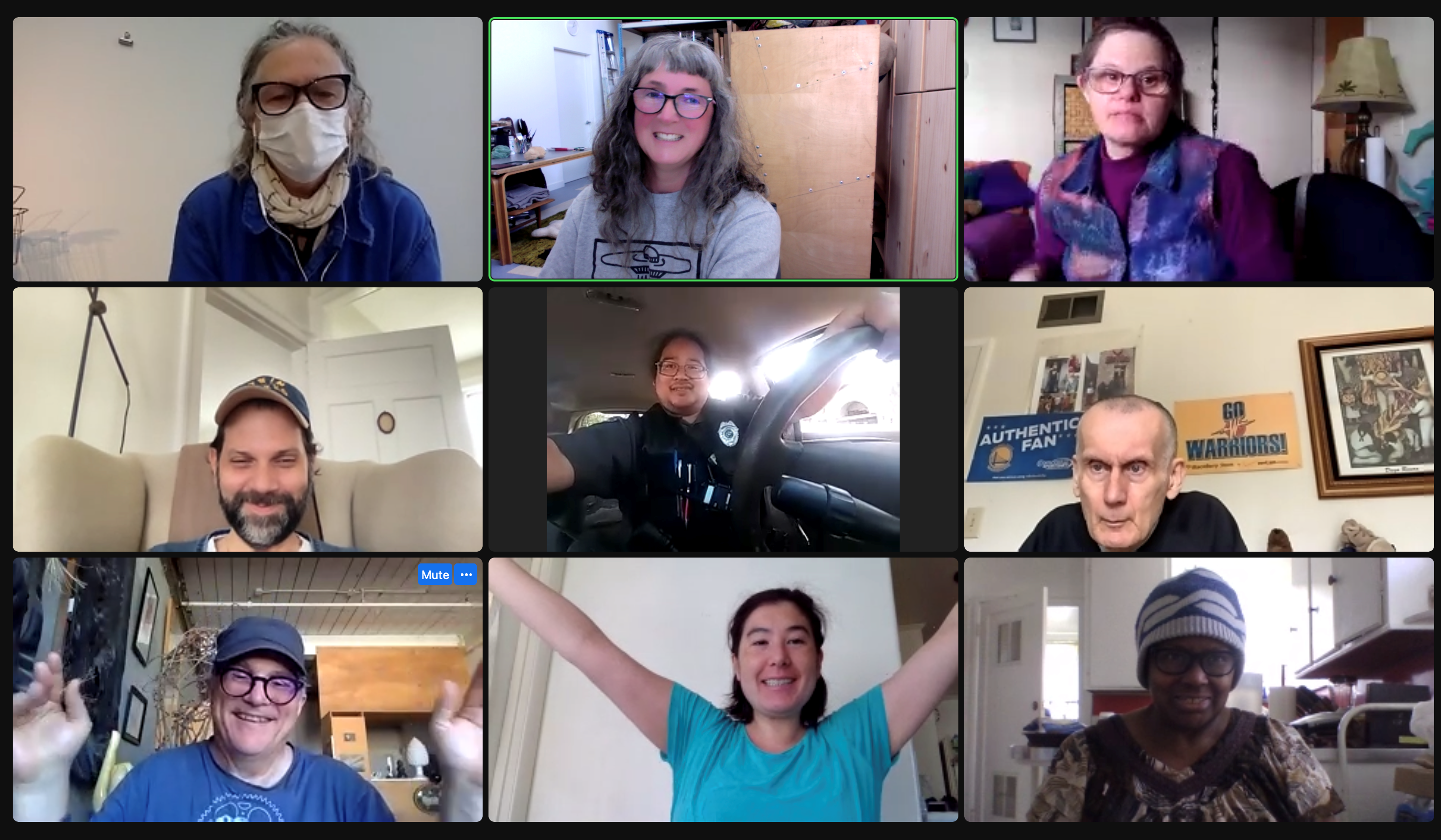“It’s really something you have to see for yourself…and a couple of times,” Kostas told me over the phone. Rather than describe his poetry workshop to me, he invited me to join a few morning classes, from 9-10 am in California, online. “It’s always different. I’m always surprised.”
Poet Kostas Anagnopoulos is a guest instructor with Creative Growth, a non-profit based in Oakland which advances the inclusion of artists with developmental disabilities in contemporary art by providing a professional studio environment and gallery representation.
The training Kostas received to volunteer with Creative Growth encouraged him to avoid any classroom dynamics with the artists. Because Creative Growth is a resource for practicing artists rather than a traditional school, workshops with guest instructors, such as Kostas, don’t follow a typical teacher/student paradigm. Kostas calls himself an “usher,” someone there to witness and guide ideas rather than impose them.
The weekly poetry workshop (Poetry! With Kostas and Kathleen) focuses on ekphrastic poems—vivid descriptions of a scene or work of art. Each written poem is inspired by a piece of visual art created by an artist from Creative Growth. Kostas chose the mode of ekphrastic poetry because he wanted to celebrate the studio art practice and mastery the participants—all artists—already had. “Because they do visual arts and that’s their expertise, I thought it was a good way for them to bring it back with a circularity.”
One compelling feature of the workshop was that the participants wrote out loud. The poets, who have developmental disabilities, do not all have the same ability to write with fine motor skills. Writing out loud creates a more accessible space, as well as the incredible opportunity to hear true first drafts out loud. The process was captivating because each new line was a spoken first draft, and the authors even surprised themselves with the words they came up with. It seemed incredibly vulnerable, but the participants wrote with a fearless forward momentum and ease. Kostas and two co-facilitators, Kathleen Henderson and Tara Tucker, shared the task of transcribing their lines.
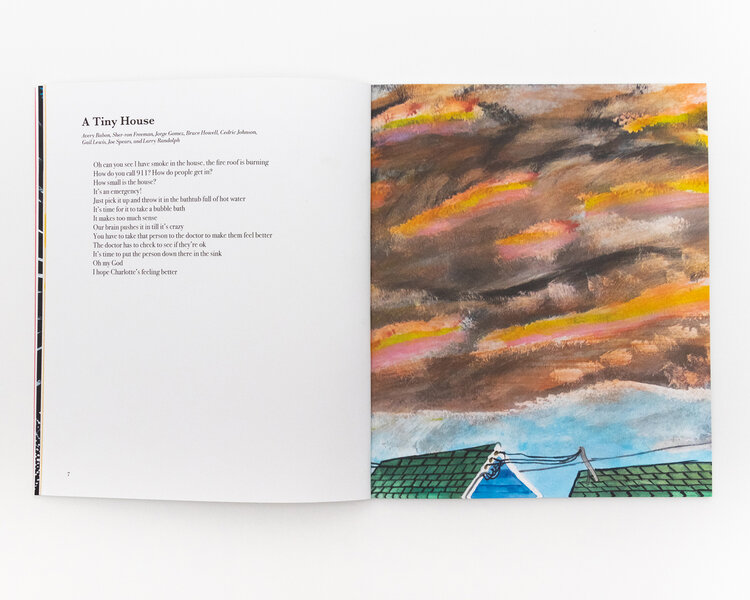
One poet, in particular, spoke with an enthusiastic timbre. He was the first to contribute to a poem inspired by a piece by the artist Aurie Ramirez: “How about SPRINGTIME!”
Tara, the scribe, checked in: “Is that with an exclamation mark?”
“Yeah!” he replied. To clarify the way the words should sound, he repeated:
“Springtime!” so the exclamation mark could be heard.
Tara wrote the line to reflect his musicality—a distinct feature of that student’s way of speaking.
Kostas has practiced poetry for about 30 years. He has published six chapbooks: Irritant, Daydream, Various Sex Acts, Some of My Reasons, Night Loop, and What Works. Although he never wanted to be in the world of academia, he says that he, “always wanted to do something with writing from the other end.”
Writing “from the other end” with Creative Growth, Kostas has been able to think about his own writing practice through listening and collaboration. I was interested to learn that one of Kostas’s favorite writing practices, which he has done for 30 years, is the collaborative practice of the Exquisite Corpse. Exquisite Corpse is a collaborative writing method by which words or images are collectively assembled. At dinner, lunch, or having tea, Kostas writes with friends and family. The practice uses a folded piece of paper. Each writer can either see the last line or follow a specific rule and then takes a turn to add to the final poem.
“Even if you know the person, you’re like—wow, you chose that to describe that? So, even the person who you know the most surprises you. It’s their brain, so it’s always mysterious.” From these collaborations, Kostas finds play, connection, love, and importantly—surprise.
“That’s what I look for in anybody’s poetry. I want to be surprised by it and see the complete unexpected. You know, the ekphrastic poems are so weird. And I say that from the bottom of my … you know, I love weird. Like who wants to read something that they already know? Or that they see coming?”
In one of the workshops I joined, a facilitator shared this image by a Creative Growth artist, John Martin.

A poet with a long and drawling musical voice spoke first. “He shouldn’t cut his own hair.”
Line by line, the student went on to create a poem inspired by John’s artwork, a story from his imagination, spoken out loud.
In that workshop, many images appeared in poems that were not in the pictures. Students wrote about mud, Superman, thunderstorms, a helicopter, x-ray vision, Canada, rain, maintenance service, the truck of string, and Christmas. One student titled his piece “Paranormal Investigation Team En Route to a Paranormal Investigation.”
Kostas smiled at the many surprises. “I’ve never seen these words in a poem before.”
One poet seemed to struggle to find the right words for his poem.
After a pause, he asked, “How about a Jon Martin story?”
“Go for it,” Kostas replied.
The student paused to think… “It’s too complicated.”
“..You know, that can be the poem. I really like that.”
Kostas read the lines back, “How about a John Martin story? / It’s too complicated.”
The group unanimously nodded at the happy surprise that came from that poet’s voice. Kostas was able to hear a poem from the writer, which the writer was unaware he had written.
Kostas acutely calls his facilitation style “hands-off”. However, he remained incredibly present during the workshops I observed. He exudes patience and curiosity, and provided wonder, surprise, and delight, rather than direction, to move the workshop forward.
After two years of facilitating with Creative Growth, Kostas’s own writing has become more open and free. A couple of months ago, he went to the MOMA and wrote an ekphrastic poem really quickly. In the past, he says it wouldn’t have come so easily. But because the group is doing it every week, writing ekphrastic poems is a much stronger muscle.
Kostas found Creative Growth through a fellow poet and friend, Lorraine Lupo, who was the first guest instructor to bring poetry workshops to Creative Growth in 2019. Kostas helped Lorraine facilitate her workshop, which went so well that Creative Growth published its first poetry chapbook, The Poem Is Telling Me I Remember in 2020.
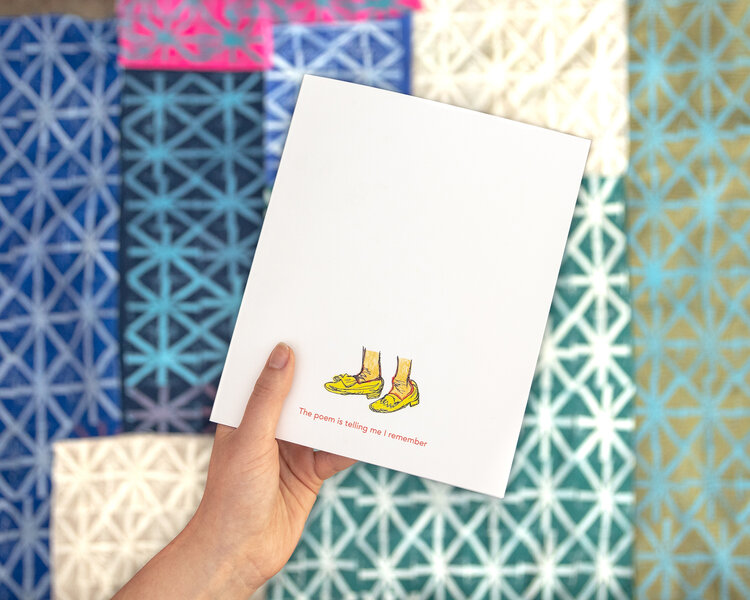
Kostas facilitates his ekphrastic poetry workshop without Lorraine, but she is still involved as an editor. Several months after the collaborative poems are written, Lorraine will edit them down. She does not change the text but extracts certain lines, so a one-page poem might turn into six or seven lines. Kostas says that with the time that passes, it’s hard to know who wrote what, and every line “becomes equal.” The group is so collaborative, too, that every line is connected to someone else or some conversation they had. Every participant will have a byline.
Because the workshops themselves are unburdened with the pressure of a final product or a desired aesthetic, the focus is entirely on the writing process. The only time the ego comes in, Kostas says, is when a participant wants to confirm, “Did you get my line?” They will also correct an error in the transcription, to make sure their voice was heard. “That’s the only time you see a little ego. Just a bit.”
In the three workshops I witnessed, Kostas asked only once or twice if he could change something a participant said. When a student pointed at the screen—“The one on the left”—Kostas asked, “Could I say ‘the building on the left’?” Only after their “okay” did he edit. The commitment to writing exactly what each student said was important.
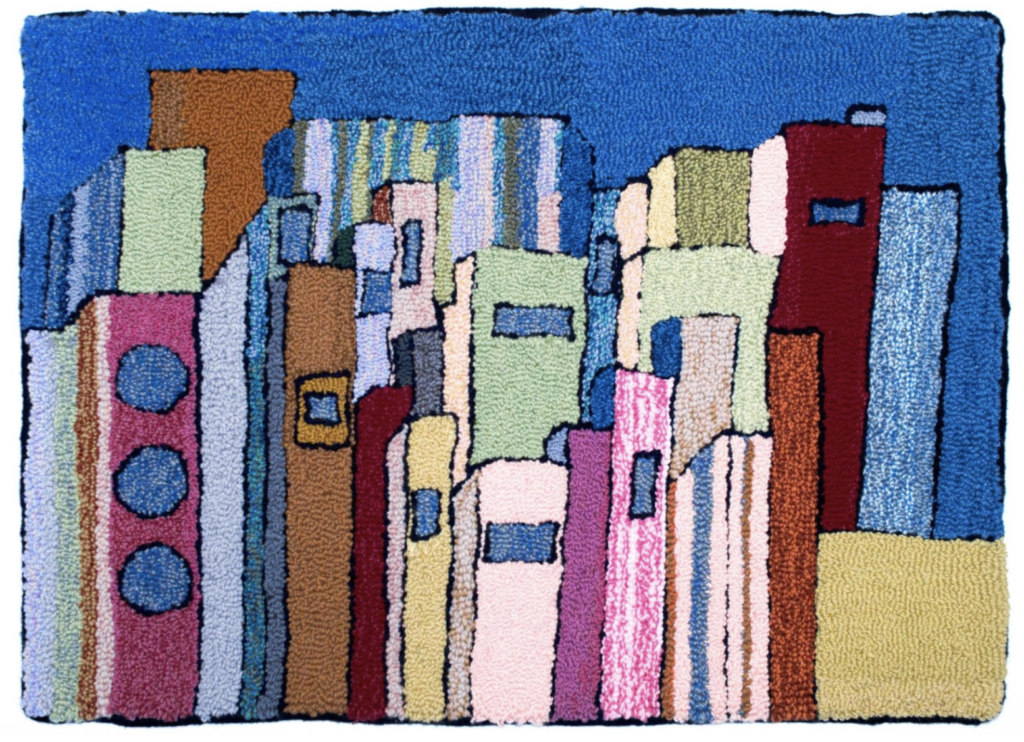
“It reminds me of Oakland…of Downtown Oakland.” A participant said. “Actually, no, there are more buildings, so SF.”
Another artist counted. “There’s actually only 23 buildings. They’re just very dense…In the denser part of downtown Oakland, there are 23 skyscrapers.”
At first, I assumed they were preparing to write with a brief discussion. But Kostas read from his laptop: “It reminds me of Oakland…of Downtown Oakland / Actually, no, there are more buildings, so SF / In the denser part of downtown Oakland there are 23 skyscrapers.”
The poets nodded.
Everyone’s voice merged into one poem, so it was not only a site of writing but also community, listening, and being heard.
“Downtown Los Angeles—the city that never sleeps. Just like New York. Las Vegas don’t sleep.”
“I wonder do these other cities sleep, or do they stay awake?”
“You have to wonder if every downtown is restless.”
Kostas plans to continue volunteering with Creative Growth because he enjoys the playfulness, surprise, and love in the workshops. Those process-heavy values allow the final poems to emerge without force.
When I met with Kostas independently, he reminded me, “You know, that workshop happens first thing in the morning. And a lot of them are, you know, there every week, and it’s their own volition.” The amazement in his voice that the participants show up by choice to work with him, was an indication of how humbly he approaches these sessions. Kostas sees the weekly workshops as a gift. “It’s all about connection,” he says.
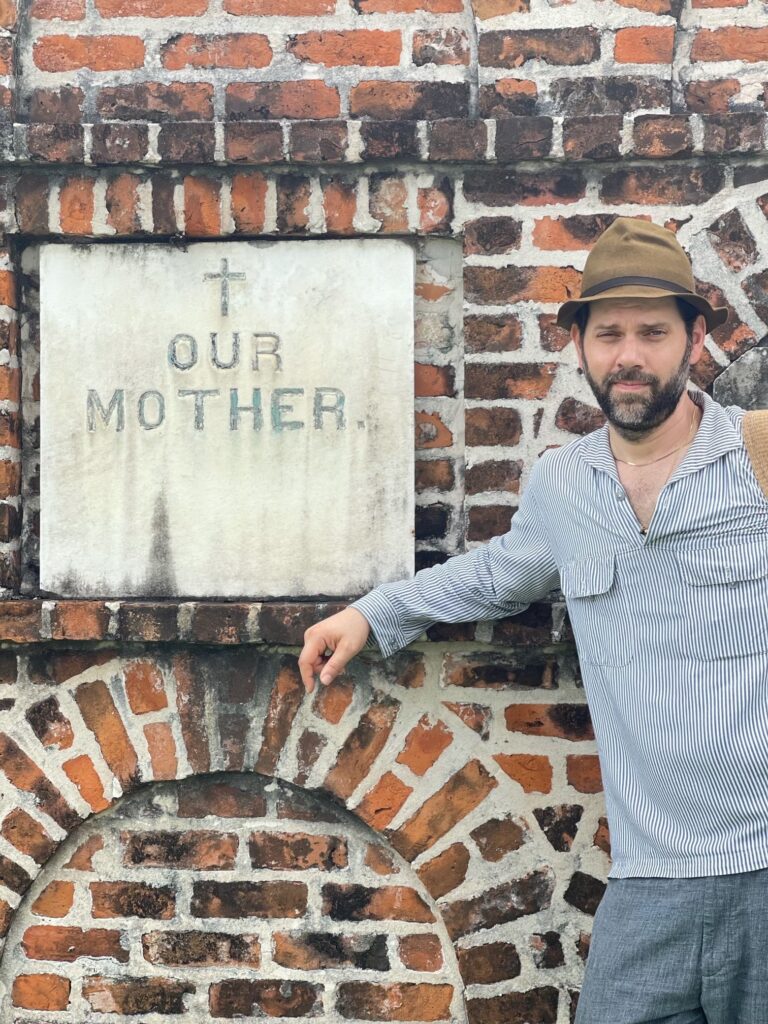
During the final session I joined, Kostas switched roles from being a facilitator to a participant. He offered several lines that appeared in the final poems. Watching the move occur so naturally, from scribing to speaking, I saw that Kostas creates a workshop environment he himself would want to write in. This environment, separate from the teacher/student paradigm of academic settings, allowed for a different style of learning to occur, learning from fellow artists, community, and surprise.
“We do so much communicating with people that is very pragmatic. And collaborating on a poem is … other than the poem itself, you don’t need anything from it. It’s outside of commerce and need. It’s somehow pure, if something can be pure.”
Here is a poem by Creative Growth Artists from their chapbook, The Poem is Telling Me I Remember:
Moving’ On! My uncle has dementia He forgets who he is I tell him who he is and he tries to remember The poem is telling me I remember The poetry makes wholesome encounters to bring people’s lives back It builds a wholesome spaceship What could we do to make us a family? I will show the pictures of the family I’ll ask them what their name is Sometimes I forget about myself Good thinking Let yourself go alone
Another poem from Creative Growth artists – Mayra, Nicole, Todd, Larry, and Jorge:
Horse Lady Horse lady, go to college and take a class Horse lady, maybe serve some breakfast Horse lady, giddy up Horse lady, you can do anything you put your mind to Horse lady, think of great magic Horse lady, try to enjoy Calistoga Horse lady, put jewelry in your purse Horse lady, don't horse around
A poem by Kostas:
Ars Poetica Carry a small waterproof notepad That fits in your breast pocket You wouldn’t want the words to run Walk whenever time allows Name at least one plant growing daily Today’s it’s daffodils There are other planets out there Alien life forms English isn’t the end-all Write as though your mind’s doing the talking Write first thing in the morning What you wrote today You won’t be able to write a year from now The best teacher’s time Carve out time from nothing Form isn’t everything Fill your pot holes with surprises Make sure your therapist has a sense of humor The Puritans can wait outside Abstraction isn’t a bad word Worship negative space Memory is a tool Read biographies Learn from the dead Use their unfinished business Don’t be an expert Have a firm handshake Bring an old person everywhere you go Don’t talk ill of someone’s condiments or mother Brighten your mail with thoughtful stamps Place both feet on the ground Watch where you’re going With gratitude
Geneva Rust-Orta is a nonfiction, sketch comedy, and stand-up comedy writer and performer. She performed her solo show, Messed Up, at the 2016 and 2017 Edinburgh Fringe Festivals. She writes for Nice Tan, an intersectional sketch comedy group originally based in San Francisco but now scattered across the country. Geneva is pursuing an MFA in Creative Nonfiction and is currently working on a collection of essays about Queer family.

